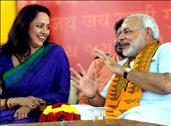The three-day Sadbhavna Mission fast of Gujarat Chief Minister Narendra Modi at the Gujarat University last month proved that his ability to polarise opinions remained intact.
His synoptic firepower was beyond doubt at the fast, which was aimed at healing the hearts and projecting his credentials as a leader with a mandate for development minted with decisiveness.
 It was an attempt to bury the ugly past of communal discord, especially the 2002 riots that had left scars of hatred and distrust between some factions.
It was an attempt to bury the ugly past of communal discord, especially the 2002 riots that had left scars of hatred and distrust between some factions.
Senior leaders of the Bharatiya Janata Party including Lal Krishna Advani, Arun Jaitley and Sushma Swaraj were present at the fast. Top officials of the Party’s erstwhile partners in the National Democratic Alliance and potential partners such as the All India Anna Dravida Munnetra Kazhagam were also present.
Beyond doubt, Mr Modi’s fast evoked fast reactions among political circles.
The Congress party dismissed it as ‘an actor’s compilation.’
The ability of Mr Modi to project as a leader of the Gujarati community in India and abroad helped him achieve his objective.
Progressive State
Under his leadership, Gujarat has become one of the most progressive states in India. People adored him and placed him in power after the Assembly Election in 2002 and 2007. He has successfully combated his critics from the secular Congress Party and Communist Party.
The fast and its popularity has catapulted Mr Modi to national leadership. The BJP, defeated and demoralised over the past seven years, suddenly finds itself in a new flurry of activity with the rising suggestion that he should be the Party’s candidate for Prime Minister in the Parliamentary election due in 2014.
Wikileaks has quoted US diplomats in India as saying that Elections 2014 would see a showdown between Rahul Gandhi (Congress) and Mr Modi.
Will he be accepted without contest within his own Party? Does he have the potential to be a successful Prime Minister?
His candidature could be contested by other BJP heavyweights such as Sushma Swaraj and Arun Jaitley.
The emerging scenario could well have a team of rivals just as former US President Abraham Lincoln did in the 19th century.
Undoubtedly, a diverse country like India requires a leader who must get used to consensual politics.
Charisma & influence
From a purely political perspective, India has produced two types of leaders belonging to the Nehru-Gandhi family and another group comprising Morarji Desai, P V Narashima Rao, Deve Gowda, Inder Kumar Gujral, Chandrasekhar and Dr Manmohan Singh. The latter, not being self-influential men, were able to build a consensual decision-making process around them.
Former Prime Minister Atal Behari Vajpayee was an exception. Charismatic and influential, he had the instinct of a democratic liberal.
Mr Modi has the acumen and support to become a national leader. That would be a political coup enlisting worldwide support of Indians in general and Gujaratis in particular. He could at least be a refreshing change in national and international politics.
Balaji Chandramohan is our Correspondent based in New Delhi






